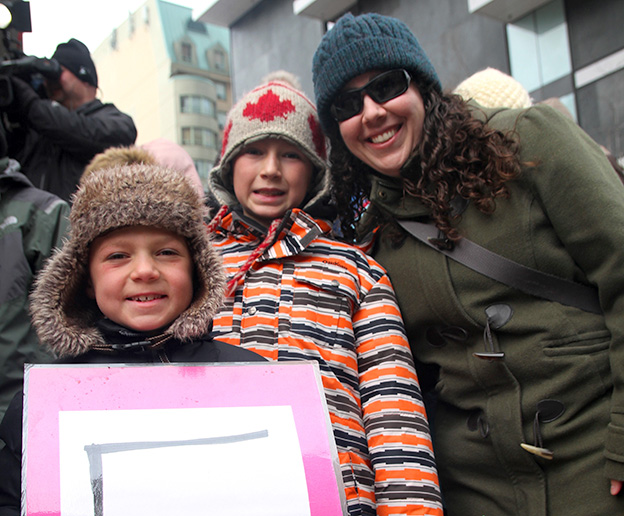PhD candidate gets by with a little help from her…nephews?

Becky Casey and her nephews, ages 6 and 10, spoke at a rally for injured workers in Toronto Dec. 8.
Completing a PhD thesis can be a daunting and lengthy process. It helps if you have a little support – say, from your nephews.
“About four years ago, I took my oldest nephew, Jake, to an injured worker rally and he was really interested in speaking,” says Becky Casey, whose doctoral research explores the challenges facing individuals who are aging with work-related injuries. “He had heard me talk about poverty and the injured worker, and it worried him.”
Jake, now 10, is a veteran of five rallies, speaking at each one. His brother, Ben, attended his first rally when he was two. Now six, Ben soon joined his big brother, stepping up to the microphone in support of injured workers’ rights.
“It’s become a tradition at the rallies,” says Casey. “The boys really know how to make a speech – it’s short, it’s powerful and it gets everyone’s attention.”
Casey is herself no slouch in the public speaking department. A finalist in the 2014 “Three-Minute Thesis” (3MT) competition, Casey won the People’s Choice Award. She donated the $250 prize to the Ontario Network of Injured Workers Groups (ONIWG).
“I learned a lot about myself and what it takes to be a good presenter,” says Casey, who successfully defended her thesis in September and is teaching a sociology course at McMaster this winter. “And it was so interesting to hear about all the great research going on at Mac and how passionate everyone is.”
During her PhD studies, Casey received several donor-funded awards, including the Ronald Bayne Gerontology Award, the Yates Scholarship Award and a named Ontario Graduate Scholarship.
This support “really helped to recognize and validate my research. I’m very thankful,” says Casey, who has also received a Mary Keyes Award for Outstanding Leadership and Service to McMaster.
Casey notes that her nephews’ commitment goes far beyond attending the rallies. “We watch a lot of videos about injured workers and unsafe work places. We also have discussions about visible and invisible disabilities and about not judging people based on how they look.”
Of course, part of the fun is missing school and going to Toronto. After the rallies, they go for pizza with the injured workers and advocates.
“I’m pretty proud of them,” says Casey of her nephews. “I hope they will continue to speak up for those who are more vulnerable in society.”

